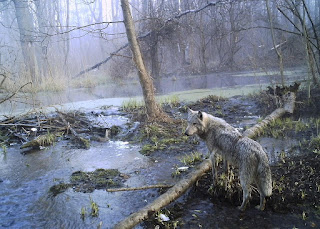photo: Sergiy Gaschak
Thirty-six years after
the humans left this place,
thriving wildlife have reclaimed
the site as sanctuary,
a green and verdant forest
covering the land,
now one of the rare places
on the planet
where wild creatures
live undisturbed.
How sad,
that it takes a nuclear event
to provide safe haven
for wild creatures,
that it takes our absence
to make their lives
more possible.
After cataclysm,
after the ocean
covers coastal shores,
after flood, wildfire,
drought and famine,
after climate refugees
have walked a thousand miles
and fallen
off the edge of the world,
it gives me comfort
to imagine
- slowly, in barely perceptible
increments of time -
greenness unfolding
across the land once more,
wolf and bear and deer
creeping back,
finding no trace of us,
making their way,
hesitant yet unhindered,
as in the earliest days
of our collective memory -
the garden unfolding
all its beauty
under friendly
benign skies
once more.
Thirty-six years later, because humans left the area, it is now thriving as a wildlife sanctuary, one place on the planet where wild creatures get to live undisturbed.
An article at Blue Dot Magazine in 2016 stated, "Humans, it seems, are worse than a nuclear disaster. A long-term study of animal populations around Chernobyl has found wildlife to be flourishing in the absence of human activity. A team of scientists surveyed the human exclusion zone surrounding the site, observing large animals like deer and elk to be in abundance despite lingering radiation."



Long may his proud tail wave. I hope the land's purified itself enough that he's safe there!
ReplyDeleteHumans are truly trying hard to be worse than nuclear disasters (which also are our creation). Sigh.
ReplyDeleteThis is a terrific piece. Reminded me of There will come soft rains by Sara Teasdale. I believe life will flourish after humanity has destroyed itself.
ReplyDeleteThis is a terrific piece. It reminded me of there will come soft rains by Sara Teasdale. I believe life will flourish after humanity has destroyed itself.
ReplyDeleteSomehow I knew those Chernobyl pups would trek into your rewilding piece ... Our sense of Earth time is so skewed, it came back after an extinction event 250 million years ago, what's a blip of human cataclysm? There's plenty of hope for the wild, just not so much for us.
ReplyDeleteYou paint the true picture of our presence here--at least our collective presence, because I do believe there are individual differences, people who strive to live *with* nature and foster her, but our apathy and greed as a species overshadows them. It's good to know that we may kill ourselves, fall off the edge of the world, as you say, but still leave the rest of earth's life reviving behind us. We are only a small part of this world, not the giant gods we think ourselves.
ReplyDeleteMay humans never return to the place. It is much better and more filled with life than it was before. Your poem paints the truth of our human failure and the glorious wilding return to such a horrible disaster.
ReplyDeleteWhat a blessing after all of these years.
ReplyDeleteThat last comment was mine. Mary
ReplyDelete"How sad,
ReplyDeletethat it takes a nuclear event
to provide safe haven
for wild creatures"
Ain't that the truth.
I enjoy watching those "life after people" programs. I've been accused of being morbid for my fascination with such things, but humans are such a destructive species. While I like individual people one on one, I despise humanity. We are cruel to each other and deadly for the world.
Humans created the lingering radiation. It comes as no surprise that nature is thriving without us there at Chernobyl. There is a component of great good in the human accompanied by very bad. Bad is winning All of the Christian Churches should be taking a hard line on the destruction of the environment because scripturally it is a grave sin to harm the environment.
ReplyDelete